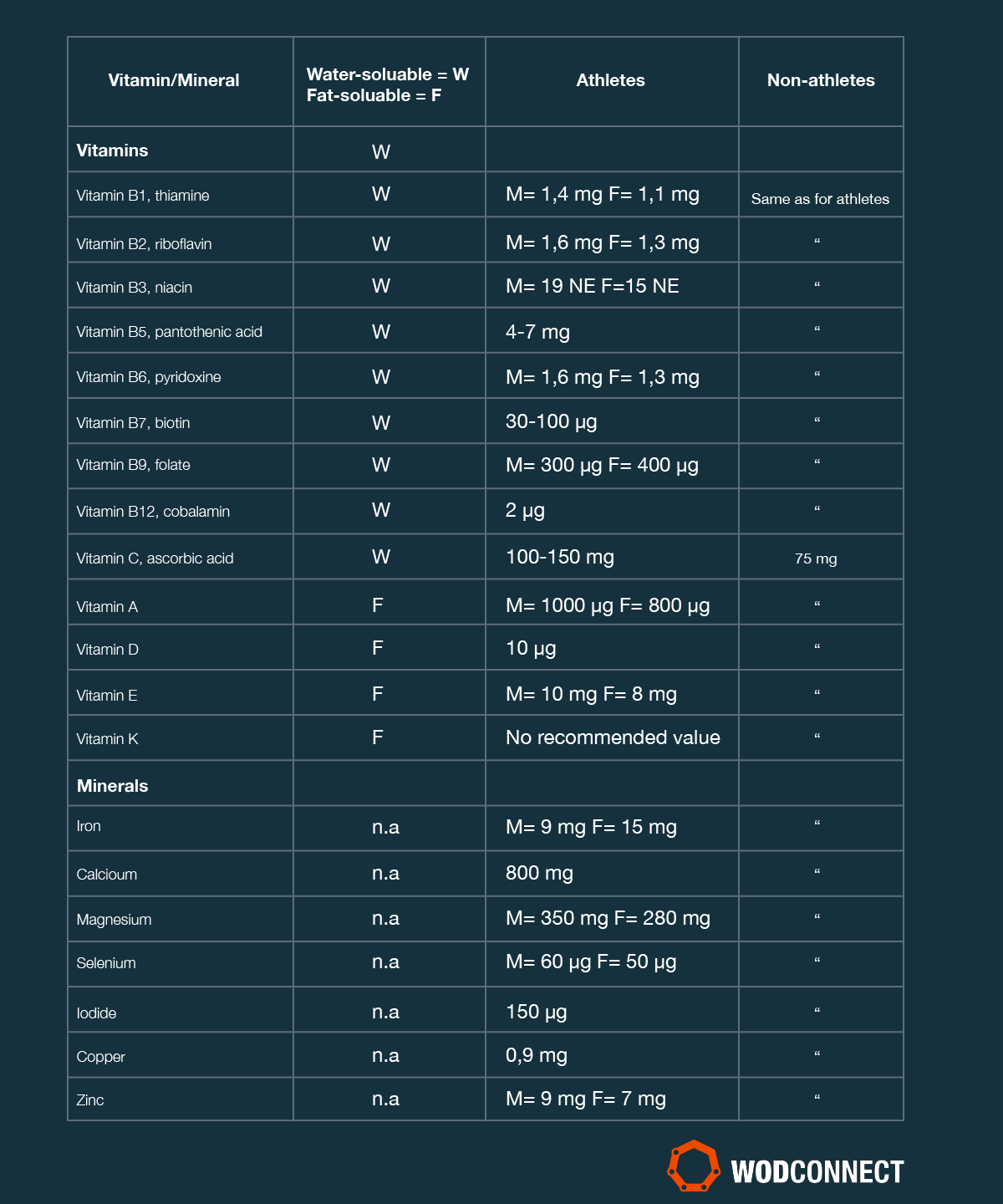Both vitamins (nutrients) and minerals (inorganic substances) are required by small amounts for various functions in the body and the diet is the main source, as generally, the body is not able to synthesize them. The need for both vitamins and minerals is individually based on the athlete’s weight, age, sex, muscle mass, disease, amount of exercise, physiological state, and health status. (British Nutrition Foundation 2018)
Athletes need to be aware of the importance of vitamins and minerals for their health, performance, and recovery. Athletes’ large activity levels set specific requirements for the volume of vitamin and mineral intakes. This blog post will go through in detail some of the main vitamins and minerals which athletes should be aware of.
Vitamins and minerals
Vitamins can be grouped into water-soluble and fat-soluble vitamins. The body stores fat-soluble vitamins (vitamins A, D, E, and K) for a long period of time, which increases the risk for toxicity especially in the case when taking vitamin supplements (see Table 1). (Aro 2015)
Water-soluble vitamins (B and C) are dissolved in water and the body absorbs them rather quickly to tissues. Generally, there is no risk of toxicity as the stores are small, and excess amounts of water-soluble vitamins are excreted in urine. As the body needs only a small amount of any vitamins (both fat-soluble and water-soluble), a rule of thumb for the best solution also for athletes is to follow a normal, well-balanced diet. (Aro 2015)
B vitamins
Vitamins from group B are needed for building and repairing tissue and for producing red blood cells. Athletes do not usually need to use any vitamin B supplements, as various vitamin B sources are found in whole foods: Good examples are grain and milk products, meat, fish, poultry, and some vegetables (e.g. potatoes). In case the athlete does not eat any animal products including meat and milk, deficiency in vitamin B12 is potential and a supplement is recommended. (Dietitians of Canada 2013)
Antioxidants: vitamins C and E, beta-carotene, and selenium
Vitamins C and E as well as selenium and beta-carotene (red plant pigment) are antioxidants protecting the body from damage and therefore important for athletes. Sources for vitamin C are e.g. citrus, strawberries, and tomatoes, and vitamin E can be found e.g. from vegetable oils and nuts. Brightly coloured vegetables and fruits are rich with beta-carotene, and sources of selenium are e.g. meat, fish, milk, nuts, and legumes. (Dietitians of Canada 2013)
Antioxidant supplements may be harmful, so it is better to eat antioxidant-rich foods instead of pills (Finnish nutrition guidelines 2014; Dietitians of Canada 2013).
Vitamin D and calcium
Vitamin D and calcium are important for bone and teeth health, muscles, nerves, and hormone functions. Vitamin D is also important for the immune system, and it is found in fatty fish, egg yolk, and from products fortified with vitamin D (e.g. milk and juices). Sun is also a source of vitamin D, as it is synthesized when the sunlight hits the skin. Sources of calcium are milk products, dark green vegetables, and fish with soft bones. (Dietitians of Canada 2013)
Iron
Iron is extremely important for athletes as it is mainly responsible for carrying oxygen to muscles during any activity. Excellent sources of iron are meat, fish, and poultry. Iron from beans, lentils, and whole grain do not absorb as efficiently as iron from animal products, but the absorption level increases while consuming vitamin C with plant-based iron sources. (Dietitians of Canada 2013)
It is common for female and endurance athletes and for vegetarians to suffer from iron deficiency, which increases the risk of anemia, low motivation, fatigue, and getting sick (e.g. flu). Make sure not to eat iron supplement if it is not necessary, as too much iron may become toxic for the body! (Dietitians of Canada 2013)
Other vitamins and minerals: vitamin A, magnesium, iodide, zinc, and copper
Deficiencies in vitamin A, magnesium, iodide, zinc, and copper are uncommon among athletes.
In case there is a potential deficiency risk of vitamin A, it is recommended to add whole foods including vitamin A to the diet instead of supplements. Excellent sources are vegetables coloured with orange and red as well as liver, egg yolk, and greasy milk products. (Ilander et al. 2014)
Magnesium is required for neuromuscular impulses and various enzymatic reactions, and magnesium-rich foods are whole grain, vegetables, and beef. Iodide, on the other hand, is needed for thyroid hormone production and regulation. Saltwater fish and iodized salt are good iodide sources. (National Institute for Health and Welfare 2018)
Zinc is required for various metabolic reactions as it affects growth and development in the body. Sources are whole grains, nuts, and meat (National Institute for Health and Welfare 2018). Copper is an essential mineral for the body, but deficiencies causing growth failures are uncommon (Duodecim 2001).

Table 1. Recommended daily intakes for the most common vitamins and minerals
Sources
Aro A. 2015. Vitamiinien yliannostus. 100 kysymystä ravinnosta. 15.10.2015. Duodecim Terveyskirjasto. (referred on 26.11.2018) www.terveyskirjasto.fi/terveyskirjasto/tk.koti?p_artikkeli=skr00023
British Nutrition Foundation 2018. Nutrients, food, and ingredients. (referred on 26.11.2018) www.nutrition.org.uk/nutritionscience/nutrients-food-and-ingredients.html
Dietitians of Canada 2013. Vitamins and minerals for athletes. Dietitians of Canada.
Duodecim 2001. Kupari imetyy kasvisdieetistäkin. Uutispalvelu Duodecim. 7.12.2001. (referred on 27.11.2018) www.terveyskirjasto.fi/terveyskirjasto/tk.koti?p_teos=uut&p_artikkeli=uut02075
Finnish Nutrition Guidelines 2014. Terveyttä ruoasta – Suomalaiset ravitsemussuositukset 2014. Valtion ravitsemusneuvottelukunta.
Ilander et al. 2014. Vitamiinit, kivennäisaineet ja fytokemikaalit – riittävästi, vaan ei liikaa. Ilander O., Mursu J., Laakkonen M. Liikuntaravitsemus – tehoa, tuloksia ja terveyttä ruuasta. VK-Kustannus Oy.
National Institute for Health and Welfare 2018. Food components. THL 2018

